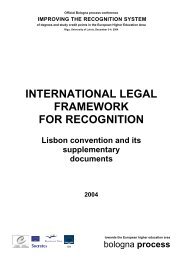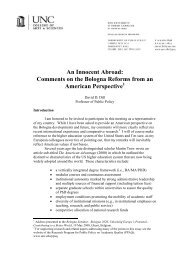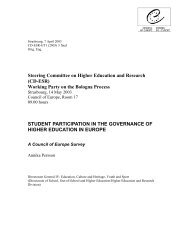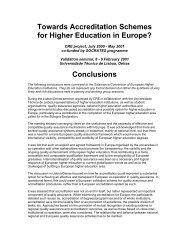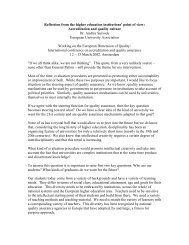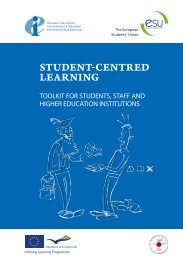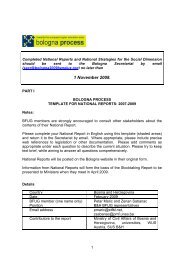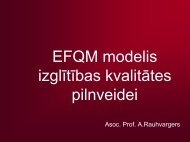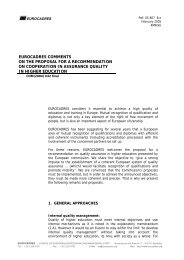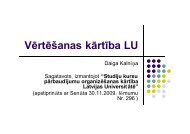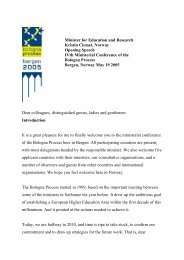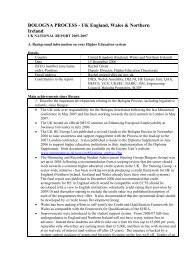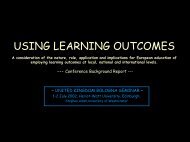EUA Survey Of Master Degrees In Europe - European University ...
EUA Survey Of Master Degrees In Europe - European University ...
EUA Survey Of Master Degrees In Europe - European University ...
Create successful ePaper yourself
Turn your PDF publications into a flip-book with our unique Google optimized e-Paper software.
6Lifelong learningAddressing the issue of lifelong learning, Trends V discerned little evidence of focused strategicthinking at institutional level. <strong>In</strong>stead, it found uncertainty and ambiguity. Is lifelong learning amode of continuing education for graduates? Or is it initial education for disadvantaged groups,delivered by HEIs?With the exception of the <strong>Master</strong> completed within five or six years following the end of secondaryeducation, virtually all manifestations of second cycle learning may be regarded as ‘lifelong’. This isas it should be. The drivers are demography (the cultural and economic aspirations of the ageingpopulation, of refugee groups) and the needs of the labour market (technological change, CPD, reskilling,raising of the retirement age, migrations).There are two approaches to lifelong learning at <strong>Master</strong> level. Provision may be routinely availableto the full range of client groups, including the traditional continuation or consecutive student (inthe sense in which the terms are used in section 4 above). Alternatively, it can be gathered into aseparate category of activity, given a ‘lifelong learning’ label and delivered, managed and fundeddiscretely. At the London summit, ministers made no recommendation regarding this distinction.They took pains to emphasise, however, that they expected a stronger focus on the recognition ofprior learning [RPL] and on flexible learning paths.Recognition of prior learningThe UK Quality Assurance Agency’s guidelines on the Accreditation of Prior Learning date from2004, although institutional engagement with RPL, notably in the old polytechnic sector, goesmuch further back. <strong>In</strong> Ireland, the National Qualifications Authority [NQAI] has had Bolognafocusedpolicies in place since 2005. Its policies are firmly centred on learning outcomes. They havea quality assurance focus, as required by the Standards and Guidelines for Quality Assurance in theEHEA [ESG], but they also address the widening of access. <strong>In</strong> France, too, the system of validationdes acquis de l’expérience [VAE] is highly elaborated and has a specifically professional and labourmarket application.Traditionally, the mode of prior learning most easily recognised is formal learning. But RPL giveshigh priority to the non-formal and informal learning now known as ‘life-wide’. The most commonexample is the recognition of successful work experience as an equivalent to academic attainment.Bologna signatory countries are keen to extend good practice in this area. The Slovenian <strong>In</strong>stitutefor Adult Education is charged with the development and validation of non-formal learning. <strong>In</strong>Finland, a national working party has recommended framework principles, within which HEIs willbe required to develop consistent, reliable and transparent RPL systems. The credit awarded willbe for demonstrable competences, rather than for durations and locations of study or of workexperience. Nationwide discussions are under way on how to refine RPL on a disciplinary basis, forexample in healthcare subjects, business administration and technology.Good practice exists, but it cannot be said that RPL is successfully operating everywhere. While theFlemish law on flexibility (2004) permits exemptions based on competences acquired outside theformal learning context, this is not yet always part of institutional practice. <strong>In</strong> Spain, RPL is not muchin evidence as a significant instrument of recruitment, admission and progression.According to the <strong>Europe</strong>an Commission (DG Employment and Social Affairs), ‘the absence of a systemof official recognition of nonformal and informal learning constitutes […] a major shortcoming’ inGreece. DG Enlargement’s 2008 review enjoins Serbia and Turkey to put RPL mechanisms in placeas rapidly as possible.Micheline Scheys, general rapporteur of the Bologna seminar held in Amsterdam in December2008, delivered a clarion call for joined-up action. She pointed to the existence of ‘islands of RPL’,44



